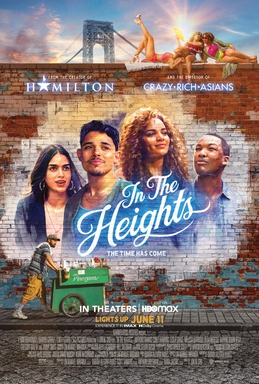IN THE HEIGHTS
Perhaps it was too much to ask that In The Heights, the film version of Hamilton creator Lin-Manuel Miranda's first musical, bring audiences back to physical theaters after the COVID-19 pandemic/panic. Pleasant but forgettable, In the Heights is acceptable, even cheerful, eager to please but not quite achieving the translation from stage to screen.
Usnavi (Anthony Ramos) recounts his story from what we think are the shores of the Dominican Republic about his years in Washington Heights. He runs the bodega on the corner, forever yearning for Vanessa (Melissa Barrera), who dreams of being a fashion designer in downtown Manhattan.
Across from him is Rosario's Dispatch, a taxi service owned by Kevin Rosario (Jimmy Smits). He's facing financial struggles affording his daughter Nina's (Leslie Grace) Stanford education. For her part, Nina finds Stanford impossible, not in terms of education but in terms of culture clash. She also still carries a torch for Benny (Corey Hawkins), her father's chief dispatcher with whom she had a romance.
There's also the local beauty parlor where Vanessa works along with its denizens, the whole neighborhood watched over by Abuela Claudia (Olga Meridez), the loving grandmother figure to everyone in the barrio.
Over the film's almost two-hour-and-fifteen minute running time, our two couples struggle towards each other and their various goals both pre-and-post blackout. There's the issue of Usnavi's bodega selling a winning lottery ticket and who could own that magical ticket. There's not just the metaphorical dreams of those in the Heights but literal "Dreamers" as Usnavi's cousin Sonny (Gregory Diaz IV) is found to be undocumented, his status unclear.
Does Usnavi return to the DR? Does Vanessa achieve her fashionista dreams? Does Nina go back to Stanford, especially after Kevin sells the rest of the business to fund it? Do our couples get together?
As I think on In the Heights, I find that as a composer Lin-Manuel Miranda has a set manner. One can see the similarity between In the Height's 96,000 and Hamilton's Cabinet Battle #1. Both are more rapped than sung in a rapid-fire manner that admittedly flows well but doesn't make for hummable tunes. In a good musical you can leave with at least one song ringing in your head. I can't think of one from In the Heights that stuck with me.
I think it comes from how the songbook has one of two speeds: extremely upbeat or extremely melancholy. You shift from the exuberance of In the Heights to the sadness of Breathe, the bombast of Carnaval del Barrio to the lovelorn nature of When the Sun Goes Down. I can imagine that on the stage, this would work great. On the film though, it sometimes feels a bit forced.
It's one thing to hear Benny and Nina duet again in When the Sun Goes Down. It may even be pseudo-magical to see them dancing horizontally on the walls of the New York City rowhouses (as far as I know it wasn't meant to be sexual). It is another to ask us to suspend disbelief when you want people already singing and dancing to suspend the laws of gravity.
I figure this number was taken from the You're All the World to Me number in Royal Wedding where Fred Astaire danced on the ceiling. Same for 96,000 which draws from Busby Berkley musicals in its geographic spectacle. Director Jon Chu knows his musical history and draws from it. However, unlike those films there seems something slightly amiss, something slightly off.
For me, In the Heights veers close to what I call forced frivolity, that sense that we the audience are supposed to be happy because the screen presents us with seemingly happy people.
Perhaps my slightly chilly response to In the Heights is that we have so many stories spinning that the film feels top-heavy, teetering on the edge of falling to its weight. One senses Usnavi's story spinning all over that we struggle to figure out what story he is telling. Truth be told, apart from Abuela's Pacienza y Fe, I can't say that any of the songs had any kind of impact. Conversely Piragua, the solo number allowing Miranda to showcase himself, was superfluous.
Pacienza y Fe did make me want to know more about Abuela's life, from how she and her mother came from Cuba to meeting New York Mayor Fiorello La Guardia to her becoming the nurturing mother hen to the neighborhood. If we ever get Abuela: The Early Years, I'd be down for it.
Certainly better than Usnavi's story. At one point I wrote, "Ya callate, Usnavi," when he essentially ditched Vanessa and almost pushed her to dance with other men. His Hamlet-like wavering between pursuing and not pursing her grew tiresome.
I thought the performances were fine, with Meridez's Abuela a standout. Ramos is charming as Usnavi (his character's idiocy notwithstanding).
In the Heights was fine. Pleasant, a bit adrift when going into the immigration debate (are all of us Hispanics/Latinos either undocumented or related to those who are?) but on the whole not a bad film. A bit longer than it should be despite cutting songs from the original Broadway show, it might be better to buy the soundtrack to enjoy the music instead.
Finally, I have a question that has yet to be answered: if everyone can speak English well, why do they insist on pronouncing "Washington" in "Washington Heights" with a strong accent (Wah-shing-TONE vs. Wah-shing-TON)?
















